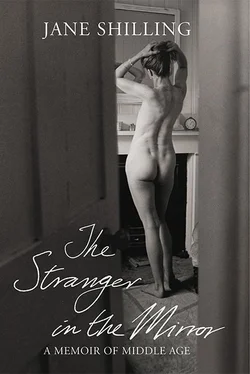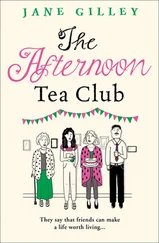She wrote frequent letters to me at university and during the vacations I went with my parents to visit her. My grandmother was knitting me, slowly because her hands were tremulous with Parkinson’s disease, a scarf. During one of these visits she put down the knitting and said, very distinctly, ‘I’m lonely.’ There was a beat of silence. Then the conversation resumed where it had left off.
She got a kitten, which helped, and she contrived to stay at home until her final illness. She died in hospital. They rang to say that we should come, but we were too late. I kept the unfinished scarf with its dropped stitches and kitten-tangled skein of wool for a long time.
Diana Athill writes of death that, ‘When I worry, it is about living with the body’s failures, because experience has shown me that when that ordeal is less hard than it might have been, it is usually because of the presence of a daughter. And I have no daughter.’
I find it easier, in middle age, to imagine myself an old woman in thirty or forty years’ time than I did as a teenager to look forward across the same expanse of time towards middle age. Even in childhood I found it possible to imagine a version of myself as an old woman, since my paternal grandmother, whose avid taste for clothes and jewels I inherited, was almost as small as me, with child-sized hands and feet and an enviable wardrobe of diminutive brocade and chiffon cocktail dresses and fur coats. The condition of being old seemed then, if anything, rather fascinating and even now that I am so much closer to it, I catch occasionally a distant echo of that childhood sense that being properly old might be quite an interesting experience.
It is when I think about the last stages, the preamble to extinction, that the swerving dread returns. No long-suffering daughter will be lifting me on to the plastic potty kept on the lace-swagged bedside table when my time comes. If my legs fail before my mind (or, almost more alarming, the other way around) I shall have to depend on the dubious kindness of strangers.
But apart from the quality of care and the warmth of human proximity, the real difference between Violet’s protracted widowhood and my grandmother’s is one of identity. Extreme age is dismantling Violet bit by bit, shrinking her world inexorably, inch by inch, yard by yard. But while her mind is clear and her family around her, her sense of who she is remains intact. She is Violet Lee, matriarch, widow of one, mother of two, grandmother, great-grandmother and great-great-grandmother of dozens. And here they all are, popping in at all hours to remind her who she is.
My grandmother, on the other hand, alone in her house for hours and days, suffered the malaise of solitude: the sense of self fluctuating like an imperfect radio signal, depending on who you’ve spoken to that day – if anyone. Sometimes, if days pass without conversation beyond the monologue of the radio, you find your jaw and tongue almost paralysed at your next human encounter – the responses slow, the banter clumsy, the words thick in your mouth. The letters she wrote to me at university are droll and nimble-witted – full of the essence of herself, comic, loving, alive with news of the kitten and her sparse sprinkling of neighbours, avid for a response from me, out there at liberty in the world beyond her village to which the death of her husband had removed her laissez passer .
Sometimes in the holidays I caught the train to see her, then walked the couple of miles from the station through featureless green tunnels of coppiced chestnut, turning down through hop gardens and orchards to the hedge of nut trees and blackberries at the back of her house. But when we met it seemed to me that the real grandma, the grandma of my memory and of her letters, was trapped somewhere inside the hardened shell of a person whom solitude had calcified into a rattling bundle of survival stratagems and eccentric economies – the meagre sprinkling of coals on the living-room fire; the stale packet of crisps put to brisk up in the oven, which shrank in the heat to the size of a doll’s-house snack.
Honestly, Grandma! said I, unable from my undergraduate eminence to understand why the old woman should be so upset at the comic dwindling of half a packet of cheese ’n’ onion. She had been a good cook, when I was younger. The taste of salt bacon rashers frying in the house in Cumberland where she and my grandfather lived when I was a child, the dark, sweet burn of her rhubarb-and-ginger jam on toast, the crisp sugary top of her sultana cake were still vivid in my mouth. I wanted her to be the same. I didn’t want to know about the circumstances that had led her to be dismayed by her failure to warm through a half-eaten packet of crisps.
I had left my parents’ house a few weeks before my A levels. I stayed with my Latin teacher while I sat the exams, spent the summer as an au pair in France and the remainder of the vacation with my grandparents. But my grandfather died suddenly, just before he was to have driven me to Oxford to begin my university course, and I made my own way there on the train.
‘Are you homesick, Miss Shilling?’ asked the Principal of my college, bald and awe-inspiring across the expanse of her book-crowded desk. ‘No!’ said I, incredulous in her winged armchair, feeling myself at ease for the first time in my life in this place of books and ideas, where no one knew me; exulting in my detachment from my family. I had prided myself on the flourish of teenage rebellion – the outlandish clothes and unsuitable boyfriends that had affronted their anxious respectability so gravely. But now I was expanding in the unaccustomed ease of not being at odds with my surroundings.
I envied my grandfather the blank page of his beginnings: the singularity of his foundling origins as an infant picked up by a policeman from the pavement of a side street behind St Pancras station. He was his own invention, I thought. His successes and failures were his alone: he had no one to blame him for the latter or appropriate the former. There seemed something heroic about the lightness of his passage through life, free from the encumbering drag anchor of family history and expectation. I don’t know whether he ever felt, himself, this sense of lightness, because I didn’t think to ask him about it before his death.
In retirement he began to write his memoirs. I have the manuscript, a fragment of 70 typed pages which reaches only as far as his teens when he discovered, on joining the Navy from a foster home in Essex, that he had no family, no ties, no history at all. Of his teenaged self he wrote that he had ‘always hoped that one day I would be reunited with my real father and mother, and perhaps with brothers and sisters’. In middle age he tried to find a way into the sealed vault of his own past, but the combination eluded him. Someone had once known who he was and where he came from, but she had vanished and with her every detail of his story before the night that the beam of the policeman’s torch, piercing the dark corners of an alley behind St Pancras, lit on the lost baby.
When my own baby was born I thought that the appearance of the next generation might somehow shore up the rickety structure of my blood ties. The solitary self-invention that felt so rich and expansive when I had only myself to sustain seemed suddenly tawdry and insubstantial. Finding myself a mother, I began for the first time since leaving home to think of myself as a daughter. Cautiously, I began to try on the unfamiliar role.
It didn’t fit. I had done too efficient a job of severing myself from my history for any attempt at reattachment to prosper. Over the years I had developed a habit of fostering myself on a series of likely-looking families – rambling, expansive organisms in which an extra person about the place was absorbed as easily as an extra kitten. These had become my prototype of an ideal family: rackety, volatile, resilient, spontaneous, uncritical. My real family – respectable, orderly to the point of rigidity, vulnerable to the unexpected turn of events – struggled with the process of parley and truce over a period of years until the expanse of uncomprehending dead ground became too wide to span with language.
Читать дальше












